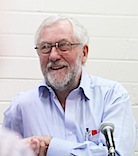Clerics lobby politicians on 'gay marriage equality'
How can I, a heterosexual who's been very happily married for 50 years, tell anyone else they don't have the right to form a loving, committed, lifelong union and enjoy the fruits of marriage as I have done? Marriage is not a club to be restricted to some. Like the Gospel, it is a blessing to be shared.
The Reverend Dr Rowland Croucher
Here we go again, twenty faith leaders have signed a letter urging people to declare their support for same-sex marriage to two federal parliamentary inquiries on the issue.
The move follows six Victorian Catholic bishops writing to their parishioners to tell them that allowing gay couples to marry would be a ''grave mistake'' and would undermine the institution of marriage.
Australian Marriage Equality convener Alex Greenwich said the pro-gay marriage clergy were ''far more in touch with their parishioners' view and indeed Australia's view on marriage equality than the six Victorian bishops''.
Some questions for Rowland and Alex:
Rowland, when did your personal experience of marriage become the source of authority on this matter? If your experience of marriage had been a different one, would that change God's will on homosexual marriage?
Alex, you claim the Catholic bishops are "out of touch with their parishioners. . . on marriage equality." If the opinion polls swing back in line with the bishop's teaching, will that make homosexual marriage wrong? The bishops are following what Jesus taught (Matthew 19:4-6) and the Christian faith have always taught on marriage. Do you regard opinion polls as a more authoritative reflection of God's will on marriage?
The last word:
The Church is not there to be popular, the Church is not there to be winning Gallup polls. The Church is there to be faithful to the teachings that we have received and passed on from millennia.
UPDATED UPDATE
The growing list of clergy who have signed a letter in support of gay marriage and the text of their letter.
Most of the signatures come from Anglican and Uniting Church clergy. They may hope that identifying with the spirit of the age will stem the tide of church decline. The most common age of their parishioners is seventy and above.
Unfortunately these clergy are being replaced by a new generation of progressive and post-evangelicals, who refuse to learn from history.

